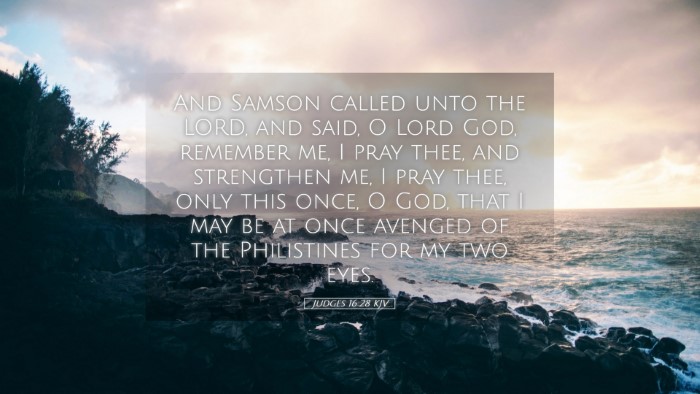Commentary on Judges 16:28
The verse Judges 16:28 reads: "Then Samson called to the LORD, saying, 'O Lord God, remember me, I pray! Strengthen me, I pray, just this once, O God, that I may with one blow take vengeance on the Philistines for my two eyes!'" This passage encapsulates the tragic story of Samson, a man endowed with immense strength yet plagued by weaknesses that led to his downfall. It offers profound insights into themes of repentance, divine mercy, and glory in weakness, making it an essential text for spiritual reflection.
Contextual Background
To fully understand this verse, one must consider the broader narrative of Samson's life, which is characterized by both extraordinary achievements and significant failures. Samson was chosen by God for a specific purpose: to begin the deliverance of Israel from the Philistines, who dominated the Israelites during this period. His unique birth, anointing by the Spirit, and the Nazirite vow provided him with exceptional strength.
However, Samson's personal choices, primarily his relationships with women and his disregard for God's commands, led him astray. His ultimate betrayal by Delilah, wherein she reveals the secret of his strength, culminates in his imprisonment and humiliation at the hands of the Philistines. The culmination of his life before this verse is marked by a physical blindness that comes from his spiritual blindness.
Literary and Theological Analysis
1. The Nature of Samson's Prayer
Samson's cry to God serves as an urgent plea for remembrance and strength. In his recognition of prior failures, he implicitly acknowledges God's sovereignty and his own need for restoration. Matthew Henry notes that Samson’s prayer illustrates how a true sense of need can lead one to earnestly seek God, even after prolonged rebellion. His words echo a lament of desperation but also a flicker of hope in God’s mercy.
2. The Role of Divine Mercy
Albert Barnes points out that this moment represents a critical juncture where God's mercy meets human frailty. Despite Samson’s previous disobedience and disregard for God's covenant, God’s willingness to respond to his plea reveals the depth of divine grace. This encounter highlights that God’s faithfulness does not waver even when His people falter profoundly.
3. Strength in Weakness
The irony of the verse comes in the acknowledgment that it is in Samson’s weakness—his blindness and captivity—that he truly seeks God's strength. Adam Clarke emphasizes that real strength in the spiritual life often arises from a place of vulnerability and reliance on God, contrasting the self-sufficiency that often leads us away from Him. Samson's physical blindness becomes symbolic of his newfound spiritual clarity as he turns to God in his darkest hour.
Theological Themes
- Repentance: Samson's call for strength signifies a repentant heart seeking to make amends for past transgressions. His lament serves as a reminder to believers of the importance of repentance and humility before God, no matter the depth of one’s failures.
- Justice and Vengeance: The mention of taking vengeance highlights a complex relationship between divine justice and personal retribution. While vengeance belongs to the Lord (Deuteronomy 32:35), Samson seeks to fulfill a God-ordained purpose, albeit through his own understanding of justice.
- Redemption through Suffering: The culmination of Samson's life serves as a poignant reminder that even through immense suffering and disgrace, God's plans can still be fulfilled, providing hope to those who feel trapped or hopeless in their circumstances.
Application for Today’s Believers
For pastors and theological students, this verse serves as a poignant reminder of the possibility of redemption and restoration, regardless of past failures. The life of Samson encourages an examination of personal fidelity to God and the implications of giving in to temptations that lead us away from our divine purpose.
Furthermore, spiritual leaders are called to remind their congregations that no one is beyond the reach of God's mercy. The church today can learn from Samson's drastic yet redeemable circumstances that emphasize the importance of humility and the power of admitting one's weaknesses before God.
In a broader context, this verse resonates with the universal quest for strength in moments of weakness. It encourages believers to cry out for divine assistance and highlights that God can use our brokenness for His glory. The narrative reassures that as we face trials and tribulations, turning to God as our source of strength is always a viable option.
Conclusion
Judges 16:28 invites profound reflection on the interplay between human frailty and divine grace. As believers engage with this passage, they are reminded that God's power is often most evident in our weaknesses. It challenges us to seek God's help earnestly, recognizing His sovereignty in our lives, and reinforces the belief that while the road may be fraught with mishaps, there is always a pathway to redemption through sincere repentance and faith.


